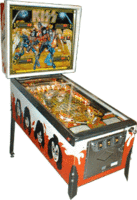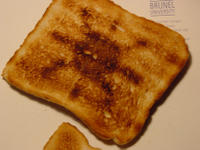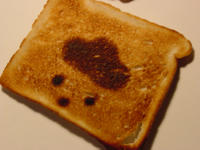 The first law of S. R. Ranganathan's Five Laws of Library Science is "Books are for use." This law applies also to puppets and stuffed animals. If no one plays with them, makes up stories with them, or holds them close for comfort, they become dust-collectors. If they’re lucky, they end up at yard-sales, where they have chances to reinvent themselves with people who actually want to play. Such was Wanda's fate.
The first law of S. R. Ranganathan's Five Laws of Library Science is "Books are for use." This law applies also to puppets and stuffed animals. If no one plays with them, makes up stories with them, or holds them close for comfort, they become dust-collectors. If they’re lucky, they end up at yard-sales, where they have chances to reinvent themselves with people who actually want to play. Such was Wanda's fate.Wanda’s prototype was a discontinued Folkmanis Kid Gloves marionette. Technically, she was supposed to be a boy. Since the prototype of Wanda's brother Marco (one of the principle players of the Boyer Children’s Clinic) was originally designed to be a girl, the teachers and I decided to roll with the emerging trend. One of Lucia’s teachers had found Wanda at a yard-sale, paid 50 cents to liberate her, and then hung her up on the wall. Even though she had jaunty black-and-white striped limbs, compared to Marco, Wanda lacked vim.
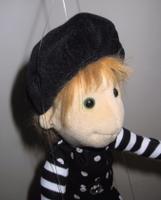 Of course, I had to take Wanda home. Lucia's fascination with the marionette made the work a challenge, but we cheerfully ignored all of our other chores so we could attend to Wanda's makeover. I trimmed Wanda's hair, sewed on tiny peridot earrings, and stitched a black and white polka-dotted dress onto her torso. A silver heart charm once found in a Christmas cracker turned into Wanda’s belt-buckle. I experimented with other accessories (green Mardi Gras beads, a silver lizard pin for the black velvet beret), but decided that the focus really should be the polka-dotted dress as a counterpoint to the striped stockings. The green high-tops stayed, of course. They were an important part of Wanda’s ensemble.
Of course, I had to take Wanda home. Lucia's fascination with the marionette made the work a challenge, but we cheerfully ignored all of our other chores so we could attend to Wanda's makeover. I trimmed Wanda's hair, sewed on tiny peridot earrings, and stitched a black and white polka-dotted dress onto her torso. A silver heart charm once found in a Christmas cracker turned into Wanda’s belt-buckle. I experimented with other accessories (green Mardi Gras beads, a silver lizard pin for the black velvet beret), but decided that the focus really should be the polka-dotted dress as a counterpoint to the striped stockings. The green high-tops stayed, of course. They were an important part of Wanda’s ensemble.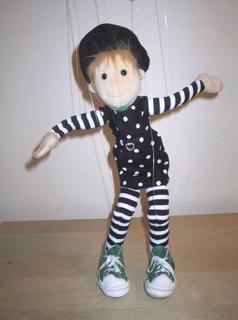 After I finished Wanda’s makeover, the arm strings bothered me. They were stretched out and didn’t help at all with arm movement. I cut the strings attached to Wanda’s hands, and restrung fishing-wire from her elbows to the puppeteer’s glove. While Wanda would never be able to clap through string manipulation alone, now she could wave.
After I finished Wanda’s makeover, the arm strings bothered me. They were stretched out and didn’t help at all with arm movement. I cut the strings attached to Wanda’s hands, and restrung fishing-wire from her elbows to the puppeteer’s glove. While Wanda would never be able to clap through string manipulation alone, now she could wave.Lucia and I are bringing Wanda back to the Boyer Children’s Clinic today. I hope that some teacher will take a shine to Wanda and work with her in the classroom. Lucia is going to miss having Wanda at home. I know that if I said to the teachers, “Please, let me keep Wanda,” they would probably say yes, but I don’t want to stand in the way of Wanda’s career. At this time, I do not have any active storytelling gigs, and Wanda has hung on the wall long enough. While Wanda is made of cloth and string, I think of her as alive, not in the way I think of the house cats or plants, but in the way that children care for their stuffed animals as friends instead of toys.
From Pablo Neruda's
"Ode to Things:"
O irrevocable
river of things:
no one can say
that I loved
only fish,
or the plants of the jungle and the field,
that I loved only
those things that leap and climb,
desire, and survive.
It's not true:
many things conspired
to tell me the whole story.
Not only did they touch me,
or my hand touched them:
they were
so close
that they were a part
of my being,
they were so alive with me
that they lived half my life
and will die half my death.








 “I have my Old Country Gazette,” Mr. Pertwee said, shaking the newsprint in front of him.
“I have my Old Country Gazette,” Mr. Pertwee said, shaking the newsprint in front of him.

